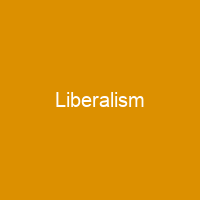Liberalism: The Philosophy That Shapes Our World
Imagine a world where every person is free to pursue their dreams without fear of oppression or discrimination. This vision is at the heart of liberalism, a political philosophy that has profoundly influenced societies around the globe. But what exactly does liberalism entail? Is it simply about individual freedom and rights, or does it encompass more complex ideas?
Liberalism emerged during the Age of Enlightenment as a response to traditional norms, advocating for representative democracy, equality under the law, and free trade. It was a radical shift from the feudal systems that dominated much of Europe at the time. The philosopher John Locke is often credited with laying the foundation for liberalism through his ideas on social contracts and natural rights.
During the British Glorious Revolution, American Revolution, and French Revolution, liberal philosophy played a crucial role in justifying the overthrow of royal sovereignty. It influenced European and South American governments in the 19th century, establishing republicanism alongside liberal principles. Today, liberal parties wield significant power worldwide, with fundamental elements of contemporary society having liberal roots.
Liberalism is often associated with blue, but in the United States, it’s linked with red (conservatism) and yellow. In Europe and Latin America, liberalism encompasses both conservative and social liberalism. In North America, liberalism primarily refers to social liberalism, advocating for a regulated market economy, expanded civil and political rights, and prioritizing the common good over individual freedom.
Key Figures in Liberalism
The development of classical liberalism took place before and after the French Revolution in Britain. Adam Smith’s The Wealth of Nations addressed key economic concepts, while John Stuart Mill was an early proponent of feminism and believed that both sexes should have equal rights under the law.
John Locke: The Father of Liberalism
Locke developed the notion that government acquires consent from the governed, which must be constantly present for government to remain legitimate. He argued that when the monarch becomes a tyrant, it violates the social contract, protecting life, liberty, and property as natural rights.
The Social Contract
In his work Two Treatises of Government, Locke outlined his major ideas, including the consent of freemen capable of forming a society and the insistence that lawful government has no supernatural basis. He also originated the concept of the separation of church and state, arguing that the government lacks authority over individual conscience.
The Evolution of Liberalism
Liberalism continued to evolve throughout history, with notable developments including the New Deal coalition in the US, the National Front’s popularity in Iran, and the civil rights movement in the US during the 1960s. However, the rise of neoliberalism in the 1970s and 1980s led to a paradigm shift away from Keynesian economics, resulting in liberal democracies facing significant competition from authoritarian regimes.
Despite its challenges, liberalism remains the dominant ideology of the modern era. It has faced criticism and support from various groups throughout history. Conservatives criticize liberal pursuit of progress and material gains, while some conservatives also share similar ideas with classical liberals. Critics like Patrick Deneen argue that liberalism has led to income inequality, cultural decline, atomization, and erosion of freedoms.
Liberalism within Islam is supported by some schools and branches, but Islamic supremacism opposes it. Social democracy advocates for progressive reform of capitalism through government action to reduce inequality. Social liberalism shares similarities with social democracy, and American liberalism can be seen as a form of ‘bootlegged’ social democracy due to the absence of significant social democratic tradition in the US.
Fascists criticize liberalism for materialism, rationalism, individualism, and utilitarianism, but some fascists also support private property rights and market economies. Despite these criticisms, liberalism continues to shape politics globally, with notable developments including the rise of China’s model of authoritarian government and economic liberalism.

Liberalism, with its rich history and diverse interpretations, remains a dynamic force in shaping our world. From the Enlightenment to the present day, it has evolved to address new challenges while maintaining core principles of individual freedom and equality. As we navigate an increasingly complex global landscape, liberalism continues to offer a framework for progress and justice.
You want to know more about Liberalism?
This page is based on the article Liberalism published in Wikipedia (retrieved on January 20, 2025) and was automatically summarized using artificial intelligence.







